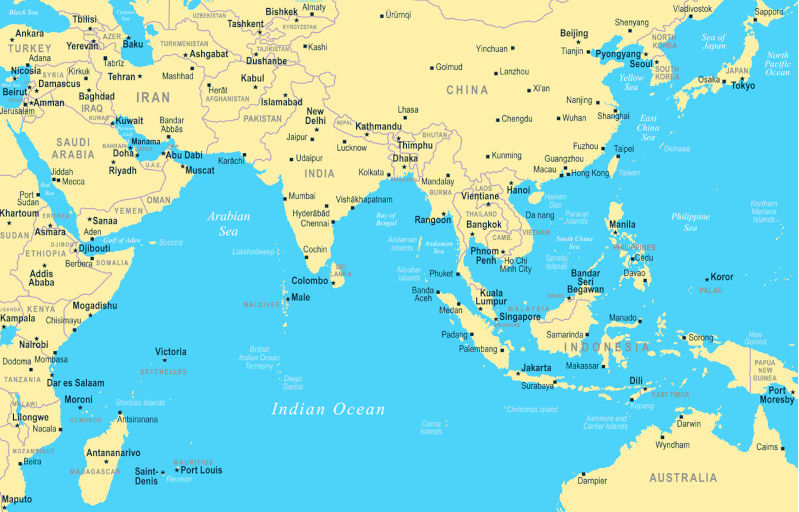Australias middle power self-image is undermining the countrys security
March 14, 2024
Australian governments routinely assert that the country is respected as a middle power in regional and global forums. Meanwhile scholars increasingly agree that the middle power concept is more fantasy than reality. In Australias case, the uncritical assumption of the middle power self-image, by many politicians and commentators, is undermining the countrys security.
Back in 1984, in the US journal Foreign Affairs, John Campbell wrote about powers great and powers small and some in between trying to speak louder than the latter and trying to exert some influence on the former. Those in betweenthe so-called middle powerscan be divided into three categories.
First there are states that assume the swagger of middle powers but whose status as such is confined to a specific geopolitical setting, like Australia and New Zealand in the South Pacific. (Martin Wight once referred to these states as regional great powers, possibly with his tongue in his cheek.)
Second, there are what we can call regional middle powersthat is, states which are limited on their own in what they can do, but which acquire influence and an increased sense of security through their membership of a regional power block, such as the European Union.
Third, there are states that claim middle power status through an alliance with great and powerful friends, an alliance based on alleged cultural affinities and pursuing mutually beneficial strategic interests. This can be labelled the dependent middle power category. Arguably its the flimsiest category in the entire middle power fantasy, because as John Mearsheimer has pointed out, great powers always regard alliances as marriages of convenience. The moment the marriage becomes inconvenient, divorce attends swiftly.
Australias middle power self-image falls squarely into the third category. Despite the on-going decline of the United States, there is a persistent belief across the country that its close alliance with the US means that the mystique of Americas superpower status rubs off on Australia. That naivety is now in danger of drawing the country into a war between the United States and China over Taiwan a war which increasing numbers of experts believe the US may not win.
Frequently in the past, Australias hollow middle-power self-image has led it not simply to punch above its weight, but way beyond its weight, almost always with negative consequences. For example, when Kevin Rudd dreamed of Australia spearheading an Asia Pacific Community, the idea burst out of the Canberra blue. Some important Asia Pacific leaders dismissed it, tout court. Others were mystified by what seemed a pie in the sky proposal about which theyd not been consulted. It quickly fell to earth like a lead balloon.
The Rudd proposal was stark evidence of Australias middle power delusion that the country has influence and leadership gravitas in the region. Not a few regional leaders are inclined to think of Australia as an appendage of the United States, or as part of a related fantasy: Tony Abbotts anglosphere.
The latest evidence of the faux middle power self-image that Australia tries to project on the world stage is the deplorable AUKUS deal. Hugh Whites recent brilliant demolition of the rationale (for want of a better term) of AUKUS raises many questions about its origins and purposes. He believes (for good reason) it will never achieve any of its intended outcomes. So why ever did Australia agree to sign up to London and Washingtons combined efforts to draw Australia into their strategic orbits?
The answer of course is that Scott Morrison was cunningly manipulated into the arrangement by Australias assumed great and powerful friendsin the guise of Boris Johnson in the UK and Joe Biden in the US. Morrison was a natural true-believer in the twin myths of Australias middle power status and its membership of the anglosphere. Like Boris Johnson he was always on the lookout for strategies that would big note him. (It must have been galling for him, when the deal was being publicly announced, that Biden could not remember his name.)
As Hugh White has made abundantly clear, the AUKUS deal is total humbug. Its cost, the details of how it is to be achieved in a time frame that makes any sense at all, and the fact that it actually endangers Australias security rather than enhances it, is the consequence of a perverse middle power self-image to which the country remains in thrall. Morrisons simplistic falling for the deal is perfectly understandable. He believed that what he mistook as Australias middle power status would be strengthened by AUKUS. That it actually undermines the countrys security was beyond his comprehension.
More confusing, however, is the Albanese governments full embrace of the deal. There is a weak rationale for this: Labor was fearful of being wedged on the matter in the lead up to the 2022 federal election. However, Albanese has remained full-throated in his defence of the AUKUS craziness when we could have expected him to be more circumspect, while preparing the policy ground for ditching the proposal altogether. Sadly, it appears that Albanese too is captive to the belief that Australia is a respected middle power able to exert influence on its great and powerful allies. This is utterly risible. Like others in his ministryfor example Richard Marleshe remains convinced (despite all the evidence) that the United States remains the backbone of Australias security, for now and for the foreseeable future.
In an interview with the Australian Financial Review in February, Paul Keating astutely observed: To come of age Australia has to have a new and altogether different idea of itself. He has hit the nail squarely on the head. Its time to abandon the fake middle power self-image that is such a serious impediment to the countrys national interest. In the first instance this will mean redefining and down-grading the ANZUS alliance, insisting on the removal of US bases like Pine Gap from Australian soil. It will require close and knowledgeable engagement with our Asian neighbours. (Bob Hawke described this as enmeshing the country in Asia.) It should mean aligning Australia with the ideals and principles of the Non-Aligned Movement, a movement whose day is coming. And it must devise a calm and steady diplomatic relationship with China based on significant mutual interests.

